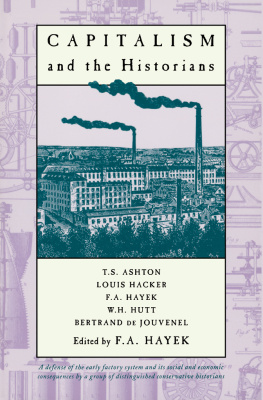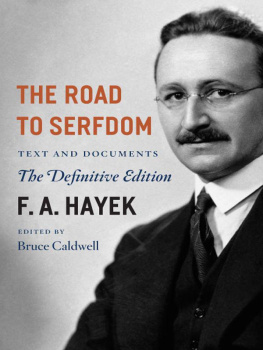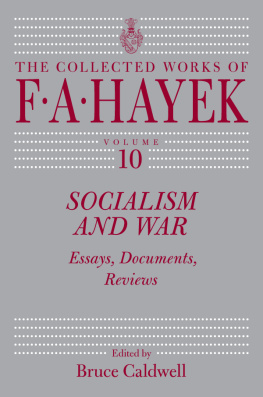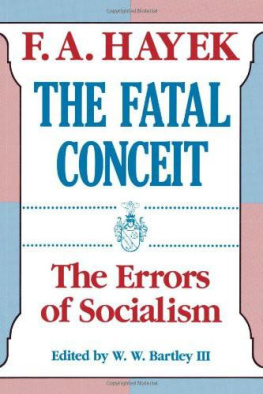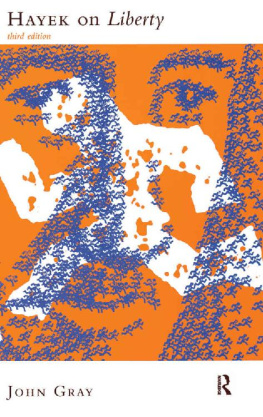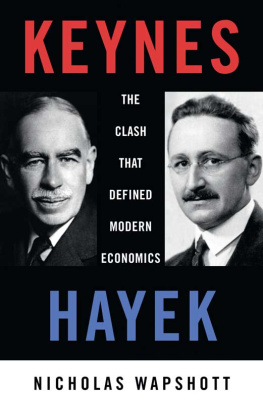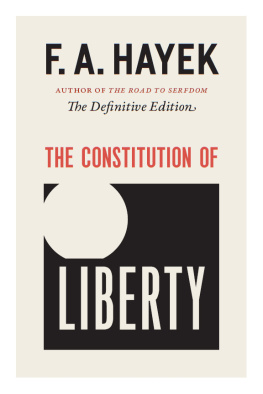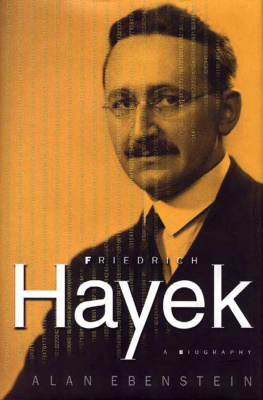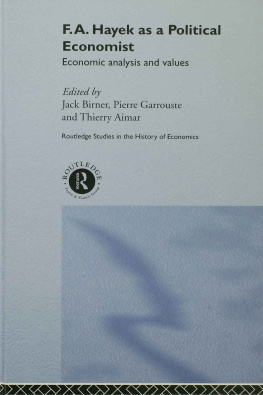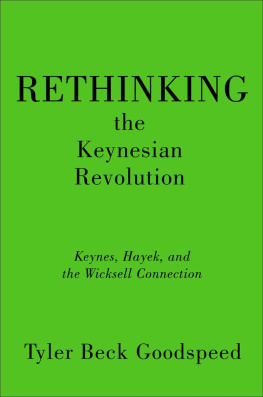F. A. Hayek - Capitalism and the Historians
Here you can read online F. A. Hayek - Capitalism and the Historians full text of the book (entire story) in english for free. Download pdf and epub, get meaning, cover and reviews about this ebook. year: 1954, publisher: The University of Chicago Press, genre: Politics. Description of the work, (preface) as well as reviews are available. Best literature library LitArk.com created for fans of good reading and offers a wide selection of genres:
Romance novel
Science fiction
Adventure
Detective
Science
History
Home and family
Prose
Art
Politics
Computer
Non-fiction
Religion
Business
Children
Humor
Choose a favorite category and find really read worthwhile books. Enjoy immersion in the world of imagination, feel the emotions of the characters or learn something new for yourself, make an fascinating discovery.
Capitalism and the Historians: summary, description and annotation
We offer to read an annotation, description, summary or preface (depends on what the author of the book "Capitalism and the Historians" wrote himself). If you haven't found the necessary information about the book — write in the comments, we will try to find it.
Capitalism and the Historians — read online for free the complete book (whole text) full work
Below is the text of the book, divided by pages. System saving the place of the last page read, allows you to conveniently read the book "Capitalism and the Historians" online for free, without having to search again every time where you left off. Put a bookmark, and you can go to the page where you finished reading at any time.
Font size:
Interval:
Bookmark:

CAPITALISM AND THE HISTORIANS
Edited and with an Introduction by
F. A. HAYEK
Essays by
T. S. ASHTON
L. M. HACKER
W. H. HUTT
B. DE JOUVENEL

Phoenix Books
THE UNIVERSITY OF CHICAGO PRESS
THE UNIVERSITY OF CHICAGO PRESS, CHICAGO 60637
Copyright 1954 by The University of Chicago. All rights reserved
Published 1954. Paperback Edition 1963
Printed in the United States of America
04 03 02 01 00 16 17 18 19 20
ISBN 0-226-32072-3 (paperbound)
ISBN 978-0-226-32113-4 (ebook)
 The paper used in this publication meets the minimum requirements of the American National Standard for Information SciencesPermanence of Paper for Printed Library Materials, ANSI Z39.481984.
The paper used in this publication meets the minimum requirements of the American National Standard for Information SciencesPermanence of Paper for Printed Library Materials, ANSI Z39.481984.
Preface
The first three papers in this volume were originally presented to a gathering of an international group of economists, historians, and social philosophers who for some years have been meeting regularly to discuss the problems of the preservation of a free society against the totalitarian threat. One of the topics of discussion at the meeting of this Mont Plrin Society held at Beauvallon in France in September, 1951, was the treatment of capitalism by the historians. Of the four papers which served as the basis for the discussion, one, by Professor M. Silberschmidt of Zrich, is unfortunately not available in writing; nor is there a transcript of the lively discussion which ensued. It was felt by the participants in the discussion that the three written papers ought to be published, and it was suggested that this might be usefully combined with reprinting some earlier papers by members of the Society dealing with closely connected topics. Charged with the execution of this plan, I have tried, in an Introduction which draws heavily on what I have learned in the discussion, to explain the wider significance of the problem discussed in the following pages.
The second paper by Professor Ashton contained in the volume originally appeared in the Journal of Economic History, Supplement IX, 1949, and the paper by Professor Hutt in Economica for March, 1926. I have to thank the editors and publishers of both journals for the permission to reprint these articles.
F. A. HAYEK
INTRODUCTION
History and Politics
F. A. HAYEK
Political opinion and views about historical events ever have been and always must be closely connected. Past experience is the foundation on which our beliefs about the desirability of different policies and institutions are mainly based, and our present political views inevitably affect and color our interpretation of the past. Yet, if it is too pessimistic a view that man learns nothing from history, it may well be questioned whether he always learns the truth. While the events of the past are the source of the experience of the human race, their opinions are determined not by the objective facts but by the records and interpretations to which they have access. Few men will deny that our views about the goodness or badness of different institutions are largely determined by what we believe to have been their effects in the past. There is scarcely a political ideal or concept which does not involve opinions about a whole series of past events, and there are few historical memories which do not serve as a symbol of some political aim. Yet the historical beliefs which guide us in the present are not always in accord with the facts; sometimes they are even the effects rather than the cause of political beliefs. Historical myths have perhaps played nearly as great a role in shaping opinion as historical facts. Yet we can hardly hope to profit from past experience unless the facts from which we draw our conclusions are correct.
The influence which the writers of history thus exercise on public opinion is probably more immediate and extensive than that of the political theorists who launch new ideas. It seems as though even such new ideas reach wider circles usually not in their abstract form but as the interpretations of particular events. The historian is in this respect at least one step nearer to direct power over public opinion than is the theorist. And long before the professional historian takes up his pen, current controversy about recent events will have created a definite picture, or perhaps several different pictures, of these events which will affect contemporary discussion as much as any division on the merits of new issues.
This profound influence which current views about history have on political opinion is today perhaps less understood than it was in the past. One reason for this probably is the pretension of many modern historians to be purely scientific and completely free from all political prejudice. There can be no question, of course, that this is an imperative duty of the scholar in so far as historical research, that is, the ascertainment of the facts, is concerned. There is indeed no legitimate reason why, in answering questions of fact, historians of different political opinions should not be able to agree. But at the very beginning, in deciding which questions are worth asking, individual value judgments are bound to come in. And it is more than doubtful whether a connected history of a period or of a set of events could be written without interpreting these in the light, not only of theories about the interconnection of social processes, but also of definite valuesor at least whether such a history would be worth reading. Historiography, as distinguished from historical research, is not only at least as much an art as a science; the writer who attempts it without being aware that his task is one of interpretation in the light of definite values also will succeed merely in deceiving himself and will become the victim of his unconscious prejudices.
There is perhaps no better illustration of the manner in which for more than a century the whole political ethos of a nation, and for a shorter time of most of the Western world, was shaped by the writings of a group of historians than the influence exercised by the English Whig interpretation of history. It is probably no exaggeration to say that, for every person who had firsthand acquaintance with the writings of the political philosophers who founded the liberal tradition, there were fifty or a hundred who had absorbed it from the writings of men like Hallam and Macaulay or Grote and
Whether in any relevant sense Whig history really was wrong history is a matter on which the last word has probably not yet been said but which we cannot discuss here. Its beneficial effect in creating the essentially liberal atmosphere of the nineteenth century is beyond doubt and was certainly not due to any misrepresentation of facts. It was mainly political history, and the chief facts on which it was based were known beyond question. It may not stand up in all respects to modern standards of historical research, but it certainly gave the generations brought up on it a true sense of the value of the political liberty which their ancestors had achieved for them, and it served them as a guide in preserving that achievement.
The Whig interpretation of history has gone out of fashion with the decline of liberalism. But it is more than doubtful whether, because history now claims to be more scientific, it has become a more reliable or trustworthy guide in those fields where it has exercised most influence on political views. Political history indeed has lost much of the power and fascination it had in the nineteenth century; and it is doubtful whether any historical work of our time has had a circulation or direct influence comparable with, say, Macaulays
Font size:
Interval:
Bookmark:
Similar books «Capitalism and the Historians»
Look at similar books to Capitalism and the Historians. We have selected literature similar in name and meaning in the hope of providing readers with more options to find new, interesting, not yet read works.
Discussion, reviews of the book Capitalism and the Historians and just readers' own opinions. Leave your comments, write what you think about the work, its meaning or the main characters. Specify what exactly you liked and what you didn't like, and why you think so.

